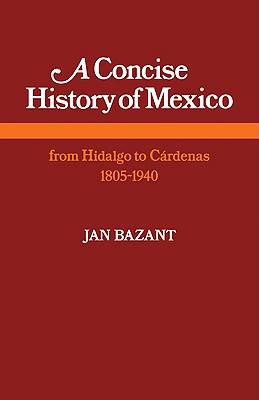
- Afhalen na 1 uur in een winkel met voorraad
- Gratis thuislevering in België vanaf € 30
- Ruim aanbod met 7 miljoen producten
- Afhalen na 1 uur in een winkel met voorraad
- Gratis thuislevering in België vanaf € 30
- Ruim aanbod met 7 miljoen producten
Zoeken
€ 60,95
+ 121 punten
Omschrijving
Jan Bazant has woven into a coherent whole the chaotic series of political and social upheavals that characterised Mexican history from the start of the struggle for independence through the completion of basic social reforms in 1940. The colonial reaction to the forced loans exacted by the Spanish government in 1805 to finance its war against Great Britain was, in Professor Bazant's view, the starting point of the Mexican independence movement. She argues that a new phase of Mexican history began when the liberals abolished the power and wealth of the Catholic Church. Mexico's rapid economic growth in the last quarter of the nineteenth century was largely the result of the stable political climate created by the dictatorship of Porfirio Diaz. Under Diaz however, most rural areas remained backward and it was precisely the contradiction between the urban, industrial economy and the traditional structure of the countryside that led to the Mexican civil war between 1910 and 1920. The agrarian reform finally transformed the rigid social system and created Mexico as we see it today.
Specificaties
Betrokkenen
- Auteur(s):
- Uitgeverij:
Inhoud
- Aantal bladzijden:
- 236
- Taal:
- Engels
Eigenschappen
- Productcode (EAN):
- 9780521291736
- Verschijningsdatum:
- 27/05/1977
- Uitvoering:
- Paperback
- Formaat:
- Trade paperback (VS)
- Afmetingen:
- 139 mm x 209 mm
- Gewicht:
- 303 g

Alleen bij Standaard Boekhandel
+ 121 punten op je klantenkaart van Standaard Boekhandel
Beoordelingen
We publiceren alleen reviews die voldoen aan de voorwaarden voor reviews. Bekijk onze voorwaarden voor reviews.











